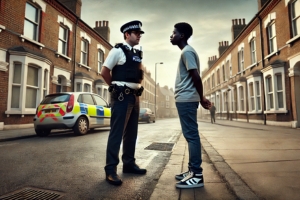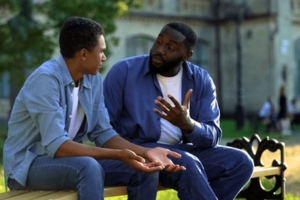
4-minute read
Have you ever found yourself lying awake at night, heart heavy with worry about your teenager’s safety during interactions with the police? It’s a question that lingers for many parents and caregivers, especially when history and statistics both suggest that Black children, particularly boys, will one day be seen not as kids, but as threats. Ensuring teens safe during police encounters is something every parent should consider.
The idea of giving a child “The Talk” isn’t about discussing birds and bees, but about survival. How to keep your hands visible. How to stay calm even when you’re being treated unfairly, and how to make it home. But what does it mean when parents have to prepare their children for an encounter that shouldn’t even be dangerous in the first place?

The statistics paint a grim picture. Black people in the UK are three times more likely to be arrested than their White counterparts. Black children are disproportionately subjected to strip searches, being up to six times more likely to be searched compared to national population figures. These numbers aren’t just statistics; they reflect the everyday realities of a system that has long viewed Black bodies as something to be monitored, controlled, and contained.
For some parents, the first wave of fear doesn’t hit when their child turns 16 or even 13—it starts much earlier. I remember a conversation with my sister as she watched her toddler son play. He was still chubby-cheeked and innocent, but she was already thinking ahead to the day when someone would see him as a problem instead of a child. “How long before they stop seeing him as cute and start seeing him as a threat?” she asked. This thought is rooted in the challenge of keeping teens safe during police encounters.
The relationship between Black communities and the police in the UK has been fraught for decades. The 1981 Brixton riots were triggered by aggressive stop-and-search tactics that disproportionately targeted Black people. The Macpherson Report, published in 1999 following the murder of Stephen Lawrence, officially declared the Metropolitan Police to be “institutionally racist.” Over 20 years later, a 2023 report found that institutional racism still exists within policing today.
These are not just isolated incidents or relics of the past—they form a continuous thread that weaves through every generation. And for Black parents, they create an unavoidable reality: preparing children for encounters with police is not optional, it’s necessary.

The question many parents ask themselves is, “How do I prepare my child for something that shouldn’t even be happening?” There’s no easy answer. But for those raising Black children, these are some of the conversations that take place:
For some, these conversations start as early as primary school. Because waiting too long? That’s not a luxury every Black parent feels they have.
It’s impossible to have these conversations without acknowledging how deeply unfair they are. Parents are not the ones who should be responsible for making sure their children are treated with dignity and respect by law enforcement. That is the job of the police. But because history has shown that Black lives are too often devalued, parents feel they have little choice. They teach their children how to move through the world as safely as possible. They focus on ensuring teens are safe during police encounters.
Some parents also choose to engage in advocacy work. This may involve attending community meetings, challenging police misconduct, or supporting organisations that fight for fair policing. But this is not an obligation. The burden of dismantling systemic racism should not rest on the shoulders of those who experience it. The police and White society, as the architects and beneficiaries of this system, should be doing the heavy lifting.
For parents navigating these difficult realities, here’s something to reflect on: “The ways I try to help my children stay safe when interacting with the police are…”
How do you have these conversations without making your child live in fear? How do you balance preparing them for reality while still allowing them to experience childhood? And beyond these one-on-one discussions, what should we demand from the system that continues to fail Black communities?
There are no easy answers. But the fact that we still need to ask these questions speaks volumes about the work that still lies ahead.
4-minute read I’ve spent a lot of time thinking about beauty—what it means, who gets to define it, and whether it’s really as inclusive as we like to think. And the more I look at it, the more I realize
4-minute read Let’s be honest—the Hidden Agenda Behind Beauty Ads is everywhere. They follow us on our phones, pop up in our social feeds, and even sneak their way into our subconscious when we least expect it. One minute you’re
4-minute read Have you ever found yourself stressing over every single pound while worrying about how to teach your kids the value of money? It’s a reality for many families, and let’s be honest—it’s not always easy. Despite the struggle,